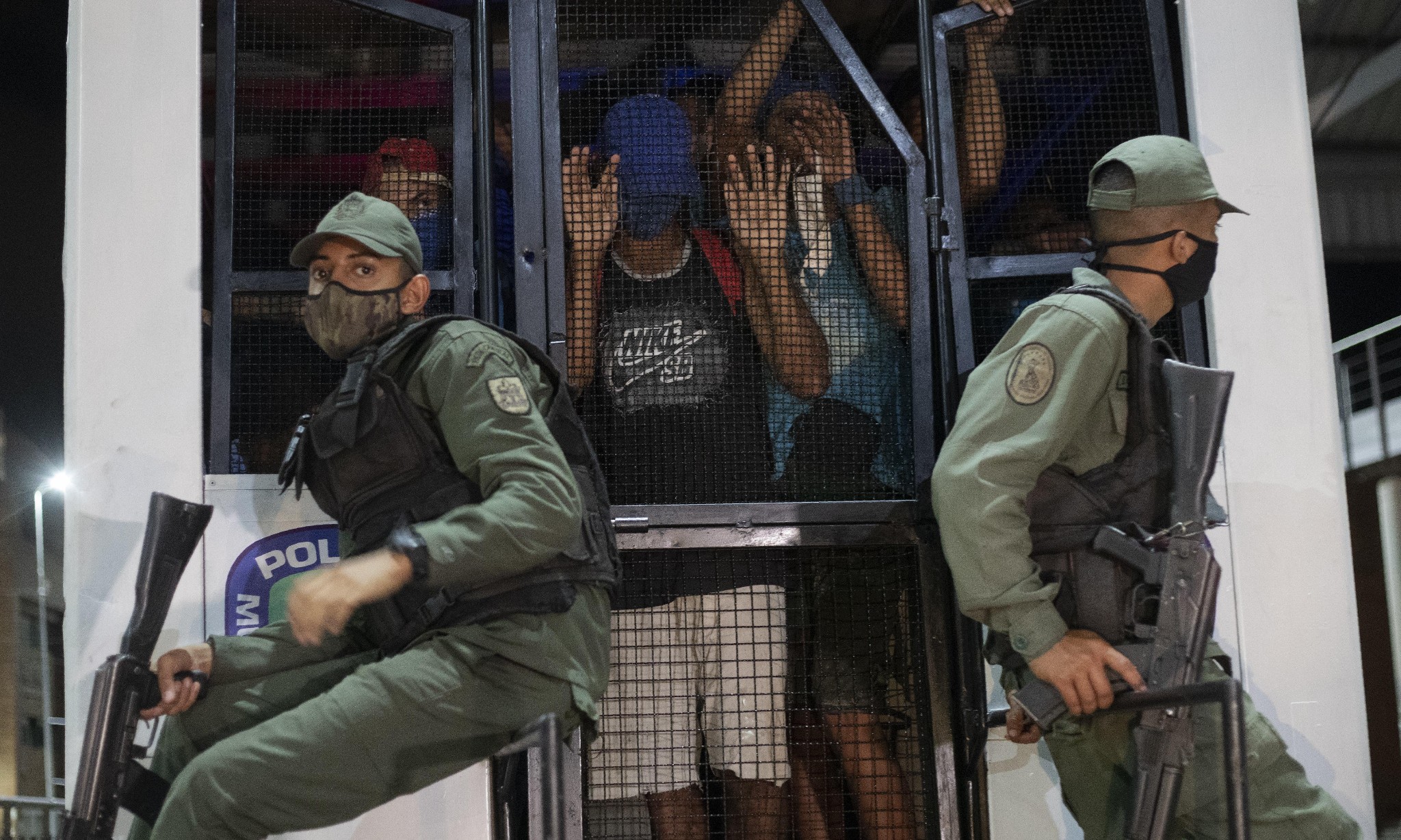Human Rights Watch says it has found a ‘very, very disturbing’ pattern of intimidation and persecution of government critics
Venezuelan police guard men who were detained for not complying with Covid-19 regulations by breaking curfew or attending block parties in the Petare neighborhood of Caracas this month.
Venezuelan security forces are using the coronavirus pandemic as cover to wage a disturbing “full force” campaign against dissenters, according to a new report by Human Rights Watch.
The New York-based human rights group said that dozens of journalists, health professionals, human rights lawyers and government opponents had been arbitrarily detained and prosecuted since President Nicolás Maduro declared a Covid-19 state of emergency in mid-March.
“What we are seeing is that the lockdown measures and Covid have become a wonderful excuse for the Maduro regime to do what it knows how to do best, which is crack down,” said Tamara Taraciuk, the group’s Venezuela specialist and deputy Americas director. “What we are seeing is that Venezuela’s police state is moving ahead with full force.”
Taraciuk said activists had detected a “very, very disturbing” pattern of intimidation and persecution designed to cow government critics and conceal the true scale of Venezuela’s epidemic.
Venezuela’s official Covid-19 death toll is just 358 compared with nearly 120,000 in neighbouring Brazil. But many fear the situation is worse than Maduro’s government is admitting and likely to deteriorate as the country’s already collapsed hospitals struggle to respond.
The Human Rights Watch report said one bioanalyst in the western state of Trujillo was forced to resign and interrogated by the feared Sebin spy agency after using WhatsApp to send colleagues information about a Covid-19 patient.
A journalist in the capital, Caracas, who tweeted publicly available information about the epidemic was allegedly targeted by special forces who raided his house and assaulted two of his relatives. He was later charged with “using false information to destabilize the government”.
“It seems to be an attempt to limit the available information about what is actually happening in the country,” claimed Taraciuk, who said a parallel offensive against political objectors was also accelerating.
Its targets have included Junior Pantoja, an opposition organizer who was seized by security forces on 8 May and died of suspected Covid-19 this week, and Nicmer Evans, a Chavista dissident and political commentator who was detained on 13 July for allegedly “inciting hatred” against the government.
Evans – a former official in Hugo Chávez’s administration – became a vocal Maduro critic after splitting with Chavismo in 2013. Last year he helped broker talks between former Chávez ministers and Juan Guaidó, the opposition leader trying to force Maduro from power.
“Chavismo is broken … If they carry on like this, they will have nothing left,” Evans told the Guardian during a 2019 interview at his Caracas headquarters, urging Maduro to resign.
Taraciuk said the crackdown was being waged “under the radar” while the world was distracted by Covid-19.
Unusually, authorities were also rounding up human rights lawyers, something the activist said she had not seen in more than a decade covering Venezuela.
Some cases involved physical abuse and torture. “These are not the actions of rogue agents … this is part of a pattern of abuse with impunity that we have been seeing in Venezuela for quite some time.”
Maduro, who was elected in 2013, has been fighting for his political survival since January 2019 when a coalition of governments, including the United States, Brazil and the United Kingdom, recognized Guaidó as Venezuela’s legitimate interim leader. They justified that support claiming Maduro had stolen the 2018 presidential election which returned him to power.
But Guaidó’s challenge has petered out and he is now battling to stay relevant, as Maduro uses the pandemic to reassert his authority over their economically ruined country.
Maduro’s administration has been rocked by Covid-19’s advance. In recent weeks several key figures have been struck down including the oil minister, Tareck el Aissami; the communications minister, Jorge Rodríguez; and the Socialist party strongman Diosdado Cabello. Darío Vivas, the Chavista governor of Caracas and an important Maduro ally, died from Covid-19 earlier this month.

